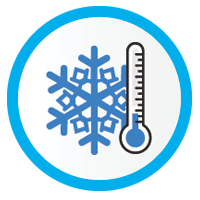Durham Region: Cold Warning and Information System (CWIS)

Cold Weather Alerts are issued by Durham Region Health Department when Environment and Climate Change Canada forecasts a temperature of -15°C or colder, and/or a wind chill of -20 or colder. This information helps community service agencies better prepare for the cold event and implement their cold response plans.
There is currently no Cold Weather Alert issued for Durham Region.
This page is updated Monday to Friday from 8:30 a.m. to 4:30 p.m.
| Learn more about the Durham Region Cold Warning and Information System |
|
Durham Region Health Department issues cold weather alerts in accordance with criteria that has been determined in conjunction with our community partners to allow for the preparation and mobilization of local cold weather response plans.
Environment Canada utilizes their own criteria to issue cold alerts. Please see Environment and Climate Change Canada for more information about their threshold criteria for issuing extreme cold weather alerts.
|
For those spending extended periods of time outdoors without sufficient protective clothing, the risk of hypothermia and frostbite is significant at wind chills of -10 and below.
Subscribe
Community partners
Durham Region Health Department gives local municipalities and community partners notification of environmental health hazards such as heat warnings, cold warnings, and poor air quality, as they provide services for those who are more at-risk in our communities. Use the button below to send us an email with "subscribe" in the subject line.
Community partners: Subscribe to environmental health hazards notifications
Durham Region residents
Sign up to receive email updates on this web page to have notifications of Cold Weather Alerts sent directly to your inbox.
Sign up to receive email updates
Cold and health
Protect yourself from frostbite, hypothermia and other cold-related injuries.
Emergency shelters in Durham Region
Winter warming locations
| Who is at risk? |
|
Those most at risk of cold-related illness are:
- people experiencing homelessness or those marginally-housed,
- those who work outdoors,
- people with a pre-existing heart condition or respiratory illness,
- elderly people,
- infants and young children,
- people with heart problems can experience worsening of their condition up to several days after cold weather occurs.
|
| Health impacts of cold weather |
|
Cold weather can result in the development of cold-related injuries, such as hypothermia, frostnip and frostbite. For at-risk groups such as people experiencing homelessness, prolonged exposure to cold or damp conditions can also result in the development of trenchfoot, also known as immersion foot.
Cold weather can make existing health conditions worse, such as cardiovascular and respiratory disease. If you suspect frostbite or hypothermia, seek medical attention immediately.
| Hypothermia |
Hypothermia occurs when the body’s core temperature drops below 35°C. At first, hypothermia causes shivering, confusion, and stumbling. With longer exposure, hypothermia can have severe consequences including organ failure and death.
Symptoms of hypothermia
Adults
- loss of muscular control (e.g., difficulty in walking)
- memory loss, slurred speech
- difficulty speaking and drowsiness
Children
- bright red, cold skin
- very little energy
How to treat hypothermia
Hypothermia is a serious medical condition. If you suspect that someone has hypothermia, seek medical attention immediately.
While waiting for medical help:
- Find a warm room or shelter.
- Keep muscles moving.
- Remove wet clothing. Replace wet things with warm, dry clothes.
- Wrap the individual in blankets/dry clothing or reheat the body through skin-to-skin contact with another person.
- Drink warm, sweet liquids.
- Don’t fight shivering, this is one of the ways your body increases its core temperature.
- If a person is unconscious lay them down and avoid shaking them or handling them roughly.
|
| Frostnip and frostbite |
Frostnip and frostbite occur when skin and other tissues freeze and die because blood and oxygen can no longer circulate. Frostnip and frostbite can affect any area of exposed skin, such as the cheeks, ears, nose, hands and feet. Of particular concern is the prolonged exposure of extremities, such as fingers and toes, to cold weather.
Frostnip symptoms
- Red and cold skin; skin may start to turn white, but is still soft.
- Prickling and numbness.
- Tingling and stinging.
How to treat frostnip
If you suspect frostnip, get out of the cold, wind, rain or snow and:
- Remove tight jewelry or clothing.
- Place cold fingers in your armpits, or warm a cold nose or cheek with the palm of your warm hand.
- Do not rub or massage the area.
Frostbite symptoms
- Skin appearing white or grayish-yellow and feeling cold to the touch.
- Skin feeling unusually firm or waxy.
- Pins and needles, followed by numbness.
How to treat frostbite
Frostbite requires medical attention. While waiting for medical help:
- Find warm shelter and remove wet clothes.
- If you can get out of the cold until medical attention is available, you can begin to warm the affected area. If warm shelter is not available and there is a possibility that skin will refreeze, do not try to warm frostbitten skin. You can rewarm by:
- immersing the affected area in warm but not hot water (the temperature should be comfortable to the touch for unaffected parts of the body), or
- warming the affected area using body heat. For example, the heat of an armpit can be used to warm frostbitten fingers.
- Do not rub the frostbitten area or massage it. This can cause more damage.
- Do not walk on frostbitten feet or toes, if possible.
- Do not use a heating pad, heat lamp, or the heat of a stove, fireplace, or radiator for warming. Since frostbite makes an area numb, you could burn it.
Frostbite can permanently damage body tissues and severe cases can lead to amputation. A person with frostbite may also have hypothermia. Get immediate emergency medical help if you suspect hypothermia.
|
|
| Be prepared for the cold |
|
Dress in layers and cover exposed skin
- Cover as much exposed skin as possible. Frostbite can develop over a relatively short period of time during cold weather.
- Wear waterproof and windproof outer layers.
- Wear a hat.
- Choose warm mittens instead of gloves.
- Wear warm, waterproof boots.
- Choose wool, silk or polypropylene inner layers of clothing, these materials hold more body heat than cotton.
- Avoid wearing wet clothing, as you are more likely to develop hypothermia if you are cold and wet.
Take care when outdoors
- Check the weather report before going outside and reschedule outdoor activities/limit time outdoors if cold weather or a winter storm is forecasted.
- Notify friends or family where you will be when travelling and going on outdoor activities, such as hiking and skiing.
- Wear several layers of warm lightweight clothing when shovelling snow and follow medical advice if you have a history of back or heart problems.
- Change into dry clothing as soon as possible if you get wet from precipitation, sweat or submersion in water.
- Be cautious when walking on ice to avoid injuries resulting from slips and falls on ice-covered surfaces.
- Keep your steps and walkways free of ice and snow by using rock salt or other de-icing compounds.
- Avoid travelling in low visibility and on ice covered roads.
- Clear your vehicle windows of all frost and snow so you can clearly see pedestrians, cyclists and other road users.
- Take a charged mobile phone.
- Make sure your car has a survival kit including a first aid kit, water and additional warm clothing.
- Warm up by taking regular breaks in heated buildings such as libraries and malls.
Get your home ready for winter
- Ensure that indoor temperature is a minimum of 21° C.
- Conduct regular maintenance, including ensuring your heating system is working properly.
- Prepare for the possibility of power outages.
- Call 211 for information on sidewalk and snow clearing and free snow removal services for senior and disabled persons.
|
| Local municipal programs to help you stay warm |
|
|
| Find shelter |
|
The Social Services Department lists site information for emergency shelters in Durham Region.
Some municipalities will list names, locations and hours of access for warming centres on their websites if they offer public access.
|
| Additional resources |
|
|






